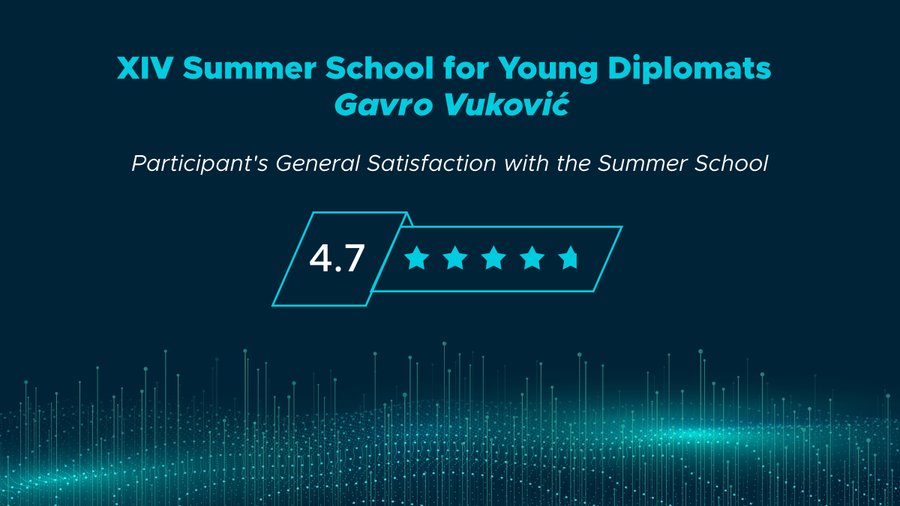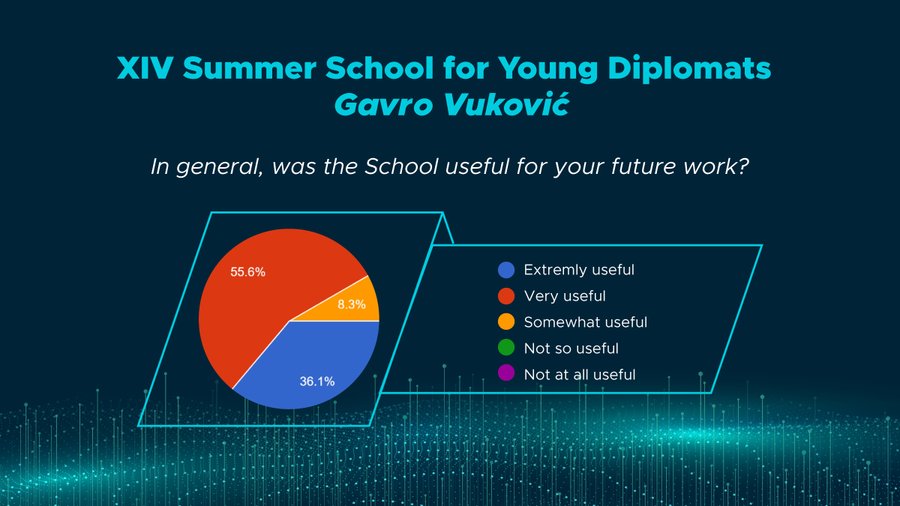Stay Connected, Shape the Future
The edition of 2021 Summer School for Young Diplomats showed that multilateralism is the key to the future of diplomacy, as well, that diplomats should be able to combine models of traditional diplomacy with models of new tools and methods for dialogue and engagement. Diplomats, leaders and decision makers in the international arena have a special responsibly to cherish multilateralism and cooperation since by doing so have nothing to lose and much to gain.
Global approach
Challenges that we face are global and require from us to work closely with partners from around the world, pointed out Benedetta Berti, Head of Policy Planning at the Office of the NATO Secretary General. She reminded that in June 2020, the NATO Secretary General laid out priorities for NATO 2030: making sure NATO remains strong militarily, becomes even stronger politically and takes a more global approach.
The Transatlantic Agenda for the Future provides a series of recommendations pertaining to NATO’s adaptation to a challenging and complex security environment and ways to enhance collective defense. The Alliance remains the transatlantic framework for strong collective defense in the Euro-Atlantic area and political platform to respond to both military and non-military matters while NATO Agenda 2030 focus on some key areas. It envisages development of a common approach to resilience and crisis management with respect to climate change and other non-military threats as well as putting deliberate focus on technological innovation of the NATO. Moreover, it emphasizes the growing importance of NATO’s role in protecting and preserving international order, based on the rule of law, democracy and strengthened cooperation. Finally, the Agenda entails development of a New Strategic Concept which represents an opportunity to delineate new challenges since 2010, identify priorities, and solidify cohesion so as to confront new strategic realities.
No One Left Behind
The pandemic has accentuated a true value of multilateralism and has demonstrated that no country alone can fight global crisis, emphasized Peter Lundberg , UN Resident Coordinator for Montenegro. He reminded participants on the history of the UN, evolution of its architecture, sustainable development goals, and its mission which fundamentally pertains to the perseverance of peace, fighting poverty, protecting human rights and economic development.
Mr. Lundberg emphasied transformative nature of global UN Agenda 2030, which profoundly relies on the “no one is left behind” approach. The UN 2030 Agenda for Sustainable Development is a plan of action focused on people and their prosperity. It should primarily contribute to ending poverty, as well as inequalities and injustices, while taking urgent action to combat climate change and its causes. In order to achieve the goals, it is necessary to mobilize resources based on a spirit of strengthened global solidarity, focused especially on needs of the poorest and most vulnerable and with the participation of all countries, all stakeholders and all people.
Work Together
” We created our multilateral system for a reason. We made it for real dialogue, real engagement, real compromise, and a real result – for all, not just one. Because in working together, we have nothing to lose – and everything to gain “, pointed out Miroslav Lajčák, EU Special Representative for the Belgrade – Pristina dialogue and other Western Balkan regional issues during his address to young diplomats.
Diplomats have a special responsibility when it comes to dialogue, engagement and making compromises, so therefore they should be equipped with adequate skills. Firstly, elements that make a diplomat truly outstanding are: competence, analytical skills, socialization skills and the ability to listen and to learn, emphasized Mr. Lajčák. Secondly, the EU project is essential in avoiding future conflicts and underlines the importance of international organizations for promoting and enacting dialogue. And finally, he pointed out how indispensable it is to respect the existing rules and the principle of equal rights and equal voices of all parties at the negotiating table.
There is no alternative to multilateralism and the hope remains that we shall learn to cherish multilateralism and cooperation as “by doing so we have nothing to lose and everything to gain.”
Future Leaders
Directors of diplomatic academies from Vienna, Zagreb, Sofia and Ankara joined their forces at the panel devoted to the future of the diplomatic training hosted by Satka Hajdarpašić, Director of the Diplomatic Academy of the Ministry of Foreing Affairs of Montenegro.
One of the greatest challenges in training young diplomats lies in the fact that they need to be prepared and deal with unexpected disruptions all the time, pointed out Ambassador Emil Brix, Director of the Diplomatic Academy in Vienna, therefore should be very important to focus on the development of diplomatic skills, and not just knowledge and information about different topics and processes. In his opinion, training in areas like how to listen to other people or understanding different cultural backgrounds and attitudes is extremely important.
The diplomatic training is a lifelong learning, reminded Lada Muraj, Director of Diplomatic Academy of the Ministry of Foreign and European Affairs of the Republic of Croatia. Both, senior and junior diplomats need continues diplomatic training and they need to be coached and supported in order to successfully perform their jobs.
Exchange between senior and junior diplomats is important, accented Tanya Mihaylova, Director of Diplomatic Institute of the Ministry of Foreign Affairs of the Republic of Bulgaria. This should lead to building trust among colleagues, gaining new knowledge and skills. Communication is definitely one of the key competencies, she emphasized.
Adapting to the new digital reality and use of technology in terms of crisis management, analysis and data visualisation, should be important part of training curriculums, added Mesut Ozcan, Director of Diplomatic Academy of the Ministry of Foreign Affairs of the Republic of Turkey. However, the future is unpredictable and there is a need for flexibility in both training of young diplomats and in addressing issues of international relations, he pointed.
Spark Long Lasting Connections
The XIV Gavro Vuković Summer School for Young Diplomats after five days of panels, debates, lectures and workshops, was closed on 9 July 2021 with online certificate award ceremony. Thanking all participants of this year’s Summer School for Young Diplomats, Satka Hajdarpašić, the Director of the Montenegrin Diplomatic Academy, pointed out the importance and role of diplomacy in reinforcing trust and cooperation with the goal of shaping a more secure future.
Emphasizing the importance of Summer School alumni network, Ms. Hajdarpašić reminded that Summer School for Young Diplomats manages to spark long lasting connections and build alumni network od 633 alumni from 82 countries of Europe, America, Asia, Africa and Australia and invited participants to preserve and further develop once established relations.

***
XIV Summer School for Young Diplomats “Gavro Vuković”, organized by the Diplomatic Academy of the Ministry of Foreign Affairs of Montenegro, was held from 5 to 9 July, 2021, in online format. It gathered 70 young diplomats from all over the world that had an opportunity to discuss issues of contemporary diplomacy with 50 prominent speakers through 20 interactive sessions over five working days. It put specific emphasis on the role and importance of diplomacy to reinforce trust and cooperation for shaping secure and prosperous future. Agenda
For this edition of the Summer School we owe particular gratitude to our long-standing partners from UNDP Montenegro who have been with us every step of the way, since 2008. This year, we are particularly thankful to our colleagues from the NATO Public Diplomacy Division who have recognised the programme of Summer School as conducive to the Euro-Atlantic agenda for a more secure world. We are thankful to our partners from the Municipality of Berane for safekeeping of heritage of Duke Gavro Vuković.

